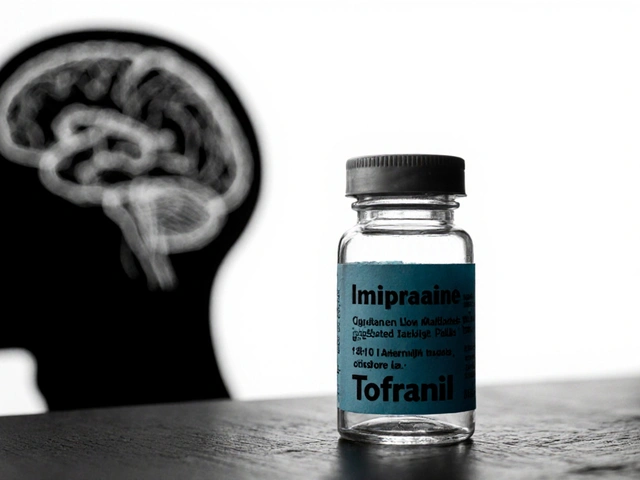When you’re taking clozapine, your mind might feel clearer-but your liver could be quietly under stress. Clozapine is one of the most effective antipsychotics for treatment-resistant schizophrenia, but it doesn’t come without risks. Among the most serious? Liver damage. It’s rare, but it can be dangerous if you don’t know what to watch for. This isn’t about scare tactics. It’s about knowing exactly how to protect yourself while getting the full benefit of the medication.
Why Clozapine Can Affect Your Liver
Clozapine is broken down mostly by your liver using enzymes called CYP1A2 and CYP3A4. That means your liver is working hard to process it. For most people, that’s no problem. But in a small number of cases-about 1 in 100-the liver gets overwhelmed. This can lead to elevated liver enzymes, inflammation, or even rare but serious liver injury.
Unlike some drugs that cause obvious symptoms like jaundice right away, clozapine-related liver issues often show up slowly. You might feel more tired than usual, lose your appetite, or notice mild abdominal discomfort. These signs are easy to ignore. That’s why regular blood tests aren’t optional-they’re your early warning system.
How Often Should You Get Liver Tests?
The guidelines are clear and non-negotiable. When you start clozapine, you need a baseline liver function test (LFT) before your first dose. After that:
- Weekly for the first 18 weeks
- Every 2 weeks from week 19 to 52
- Monthly after the first year
These aren’t suggestions. They’re mandatory under Australian Therapeutic Goods Administration (TGA) rules and FDA guidelines in the U.S. Your prescriber should have a monitoring plan already set up. If they don’t, ask for one. Missing even one test increases your risk of undetected damage.
The key markers to watch are ALT (alanine aminotransferase), AST (aspartate aminotransferase), and bilirubin. ALT and AST are enzymes that leak into your blood when liver cells are injured. If they rise more than three times the upper limit of normal, your doctor will likely pause clozapine. Bilirubin rising alongside them signals more serious trouble.
What Levels Are Dangerous?
Normal ALT levels are usually under 40 U/L. If your ALT jumps to 120 U/L or higher, that’s a red flag. A rise of more than 3x the upper limit of normal-especially if it’s accompanied by symptoms-means clozapine should be stopped immediately. In rare cases, patients have developed acute liver failure. There have been documented cases in Australia where patients needed emergency liver transplants after ignoring early warning signs.
It’s not just about the numbers. If you feel nauseous, your skin or eyes turn yellow, your urine gets dark like tea, or you have unexplained bruising, call your doctor. Don’t wait for your next blood test. These are signs your liver is struggling.
Who’s at Higher Risk?
Not everyone on clozapine will have liver issues-but some people are more vulnerable:
- People over 60
- Those with pre-existing liver conditions like fatty liver or hepatitis
- People taking other medications that stress the liver (like valproate, carbamazepine, or certain antibiotics)
- Those who drink alcohol regularly
- People with obesity or metabolic syndrome
If any of these apply to you, your doctor should be extra cautious. You might need more frequent testing, especially in the first 3 months. Some clinics in Sydney and Melbourne now do monthly LFTs for high-risk patients during the first year, even if it’s beyond the standard schedule.

What If Your Liver Enzymes Go Up?
It’s not the end of the world if your ALT rises. Many people see a mild, temporary increase in the first few weeks. This often settles on its own. But here’s what happens next:
- If ALT is 1.5-3x the upper limit: Monitor closely. Repeat test in 1-2 weeks. No change in clozapine dose.
- If ALT is 3-5x the upper limit: Hold clozapine. Re-test in 3-5 days. If it drops, restart at lower dose with weekly monitoring.
- If ALT is >5x the upper limit, or bilirubin rises: Stop clozapine permanently. Refer to a liver specialist.
Re-challenging-starting clozapine again after a liver issue-is possible in some cases, but only under strict supervision. About 30% of people who restart develop a recurrence. It’s risky, and only done if no other antipsychotic works.
Other Things That Can Worsen Liver Stress
Clozapine doesn’t work in a vacuum. Other factors can push your liver over the edge:
- Alcohol: Even one drink a day increases risk. Avoid it completely while on clozapine.
- Over-the-counter painkillers: Paracetamol (acetaminophen) is okay in small doses (under 2g/day), but avoid NSAIDs like ibuprofen if your liver is already stressed.
- Herbal supplements: Kava, green tea extract, and high-dose vitamin A can harm the liver. Tell your doctor about everything you take.
- Weight gain: Clozapine often causes weight gain, which can lead to fatty liver disease. Monitor your waistline and get regular blood sugar checks.
One patient in Perth stopped clozapine after developing severe fatty liver. He had gained 25kg in 9 months and was drinking 2-3 beers nightly. Once he cut out alcohol, lost weight, and switched to another antipsychotic, his liver enzymes returned to normal in 4 months.
What to Do If You’re Worried
If you’re on clozapine and you’re unsure about your liver health, here’s your action plan:
- Check your last LFT result. Do you know your ALT and AST numbers?
- Are you up to date with your blood tests? If not, schedule one immediately.
- Review your medications and supplements with your pharmacist. Bring a list.
- Ask your doctor: “Is my liver being monitored properly?” If they hesitate, get a second opinion.
- Track symptoms: fatigue, nausea, dark urine, itching, or yellowing skin.
Don’t wait for a crisis. The best outcomes happen when problems are caught early. Most liver issues from clozapine are reversible if caught in time.

Alternatives If Liver Risk Is Too High
If your liver can’t tolerate clozapine, other options exist. Olanzapine is often the next choice-it’s similar in effectiveness but has a lower risk of liver injury. Risperidone, aripiprazole, and paliperidone are also options, though they may not work as well for treatment-resistant cases.
There’s also emerging evidence that combining lower-dose clozapine with liver-protective agents like N-acetylcysteine (NAC) may help reduce liver stress. This is still being studied, but some Australian psychiatrists are using it cautiously in high-risk patients under close supervision.
Don’t assume you’re stuck with clozapine if your liver reacts. Work with your team to find a balance between safety and symptom control.
Final Thoughts: Stay Informed, Stay Safe
Clozapine saves lives. But it demands responsibility. The liver doesn’t complain until it’s too late. That’s why testing, awareness, and communication matter more than ever. You’re not just taking a pill-you’re managing a complex system. Your liver is working hard for you. Give it the protection it needs.
If you’re on clozapine, make liver health part of your routine. Keep your blood test appointments. Talk openly with your doctor. Avoid alcohol. Watch your weight. Ask questions. The goal isn’t to fear the medication-it’s to use it wisely.
Can clozapine cause permanent liver damage?
Yes, in rare cases. While most liver enzyme elevations are temporary and reversible, untreated or ignored damage can lead to chronic liver injury or acute liver failure. This is extremely uncommon-less than 0.1% of users-but it’s why regular monitoring is mandatory. Stopping clozapine early when enzymes rise significantly usually prevents lasting harm.
How long does it take for liver enzymes to return to normal after stopping clozapine?
In most cases, ALT and AST levels drop back to normal within 4 to 8 weeks after stopping clozapine. If the elevation was mild and caught early, recovery can happen in as little as 2 weeks. If there was significant damage, it may take 3-6 months. Follow-up testing every 2-4 weeks is recommended until levels stabilize.
Is it safe to drink alcohol while taking clozapine?
No. Alcohol increases the risk of liver damage when combined with clozapine. Both are processed by the same liver enzymes, so drinking adds extra stress. Even moderate drinking (more than one drink a day) can raise your ALT levels and make liver injury more likely. Complete abstinence is the safest choice.
Can I take paracetamol (acetaminophen) for pain while on clozapine?
Yes, but only in low doses. Stick to 500mg-1000mg per dose, no more than 2g total per day. Higher doses of paracetamol can damage the liver, especially when combined with clozapine. Avoid long-term daily use. If you need regular pain relief, talk to your doctor about alternatives like physical therapy or low-dose gabapentin.
What should I do if I miss a liver function test?
Call your prescriber or pharmacist immediately. Missing a test means you’re flying blind. Depending on how long you’ve missed, your doctor may need to delay your next clozapine dose until you get tested. In some cases, they’ll require you to come in for an urgent blood draw before continuing. Never assume it’s okay to skip a test-even if you feel fine.
Are there any natural supplements that protect the liver on clozapine?
Some doctors use N-acetylcysteine (NAC) off-label to support liver function in high-risk patients on clozapine. Studies show it may help reduce oxidative stress in the liver. However, there’s no strong evidence that milk thistle, turmeric, or other herbal supplements work reliably. Some, like kava, can actually harm the liver. Always check with your doctor before taking any supplement.
Next Steps: Your Personalized Monitoring Plan
If you’re on clozapine, write down your next three blood test dates right now. Set phone reminders. Print out your last LFT results and keep them with your medication log. Talk to your pharmacist about any other drugs you’re taking. Review your alcohol intake honestly. Make liver health a non-negotiable part of your routine.
There’s no shortcut. But with the right habits, you can take clozapine safely for years-and keep your mind and your liver healthy.





Rhonda Gentz
October 29, 2025 AT 17:28It’s wild how we treat our bodies like machines you just plug in and forget about. Clozapine doesn’t just sit there-it’s a full-time job for your liver. I think the real issue isn’t the drug, it’s how little we’re taught to listen to our own systems until they scream. Maybe medicine needs to teach patients how to feel their own biology, not just track numbers.
That said, I’m glad someone laid this out so plainly. Most people don’t realize their fatigue isn’t just ‘stress’-it’s their liver waving a white flag.
And yeah, alcohol? Just don’t. Not even one beer. It’s not worth the gamble.
I’ve seen people lose years of progress because they thought ‘I feel fine’ meant ‘I’m fine.’
Truth is, your liver doesn’t care how you feel. It only cares what’s in it.
Alexa Ara
October 30, 2025 AT 22:30You’re not alone if this feels overwhelming. I’ve been on clozapine for 6 years and honestly? I used to dread my blood tests. But now? I treat them like check-ins with my future self. Every time I get those results, I’m reminded: I’m still here because I showed up.
Small wins matter. Skipping alcohol. Writing down your test dates. Asking your pharmacist about your meds. These aren’t chores-they’re acts of self-love.
You don’t have to be perfect. Just consistent. And if you miss one? Reset, don’t quit.
I believe in you. Keep going.
Olan Kinsella
October 31, 2025 AT 00:46They say clozapine saves lives but never mention it’s basically chemical arson with a prescription.
Who decided we should poison our livers to ‘clear our minds’? The system doesn’t care if you live or die-just that you stay docile.
I’ve seen three guys on this drug turn into ghosts. One had to get a transplant. Another? Vanished. No one talks about the bodies behind the stats.
And now they want us to take NAC like it’s vitamin C? Please. This isn’t prevention. It’s damage control with a smile.
The real question: Why do we keep letting pharma turn our minds into battlegrounds?
They profit from our brokenness. Always have. Always will.
Kat Sal
October 31, 2025 AT 22:08Okay but let’s celebrate the fact that we even HAVE guidelines for this. A decade ago, people were just thrown on clozapine with zero monitoring. Now we have blood tests, timelines, warnings-it’s progress.
Yes, it’s intense. Yes, it’s a lot. But you’re not powerless. You’ve got tools. You’ve got data. You’ve got a voice to ask for more.
And if you’re worried? Call your doctor. Text your support group. Write it down. Don’t let fear silence you.
You’re not broken. You’re managing something hard. And that’s brave.
One test at a time. One day at a time. You’ve got this.
Rebecca Breslin
November 1, 2025 AT 14:19Wait-so you’re telling me you’re supposed to get tested every week for 18 weeks? That’s insane. Who has time for that? My cousin’s psychiatrist just told her to ‘get it done once a month’ and she’s been fine for 4 years. Why are we making this so complicated?
Also, NAC? That’s just a supplement. If it worked, they’d make it mandatory. And why are we blaming alcohol? I know people who drink wine every night and have perfect liver numbers. Correlation isn’t causation.
Also, why is everyone acting like this is some new miracle drug? I’ve been on olanzapine for 10 years and never had one issue. Maybe clozapine isn’t for everyone. Maybe we’re overmedicating.
Also, the FDA? They’re slow. The TGA? Overcautious. We need less bureaucracy, not more blood draws.
Kierstead January
November 2, 2025 AT 20:51Let’s be real. If you’re on clozapine, you’re already in the psychiatric system. That means you’re already labeled. And now you’re being told you can’t drink, can’t take Tylenol, can’t gain weight, can’t miss a test?
Who’s really in control here? The doctor? Or the pharmaceutical company that owns the patent?
And don’t even get me started on ‘NAC’-that’s just a Band-Aid on a bullet wound. You’re not protecting your liver. You’re just being guilt-tripped into compliance.
And if you’re over 60 or overweight? Good luck. You’re basically a walking liability.
This isn’t healthcare. It’s surveillance with a side of shame.
Wake up. You’re not being saved. You’re being managed.
Imogen Levermore
November 4, 2025 AT 10:04wait… so liver tests are mandatory? 😳 but what if they’re lying? what if the labs are rigged? i read this one blog (i think it was on medium) that said the FDA and big pharma secretly control all lab results to keep people on meds longer?? 🤔 and what if ALT levels are just… made up? like… what if the ‘normal’ range is changed every year to make more people look ‘abnormal’? 😵💫
also i heard kava is actually good for anxiety and liver?? but then why do they say it’s bad? 🤔 maybe it’s a conspiracy? 🤫
and why do they say ‘no alcohol’ but then allow wine in some countries?? this is so sus. 🕵️♀️
also i think my liver is fine i just feel tired bc the government is microwaving our brains through 5g 📶
pls send help or at least a link to the ‘real’ data 🙏
Chris Dockter
November 4, 2025 AT 20:11Everyone’s acting like this is some groundbreaking revelation but the truth is most shrinks don’t even know the guidelines
I’ve been on clozapine for 8 years and my doctor never mentioned the 18-week rule until I read it online
They just say ‘come back in a month’ and call it a day
And don’t get me started on the fact that they’ll let you take 3000mg of Tylenol a day like it’s nothing
They don’t care about your liver
They care about you showing up for your appointment
And if you miss a test? They don’t care
They’ll just refill your script and move on
This isn’t medicine
This is a business model
And you’re the product
Gordon Oluoch
November 5, 2025 AT 02:17Let me be clear. If you are taking clozapine and you are not tracking your liver enzymes with surgical precision you are not just being careless you are being reckless
There is no room for ‘I feel fine’ when your liver is silently dying
And if you think alcohol is a ‘personal choice’ while on this drug you are not just ignorant you are dangerous to yourself and everyone around you
And yes I know people who ‘got away with it’-they’re either dead or on transplant lists
There is no such thing as ‘rare’ when the consequence is liver failure
You think this is about numbers? No
This is about whether you value your life enough to follow basic rules
If you can’t do that
Then you don’t deserve to be alive
And if your doctor isn’t holding you to this standard
Find a new one
Tyler Wolfe
November 6, 2025 AT 02:26Hey I’ve been on clozapine for 5 years and I’ve never missed a test. I set reminders. I write my numbers in a little notebook. I don’t drink. I walk every day.
It’s not perfect. But I’m here. And I’m stable.
Some days are hard. But I’ve learned that showing up-even when it’s boring or annoying-is what keeps me alive.
I used to think this was all about pills. Now I know it’s about habits.
And yeah, sometimes I typo things. Like ‘liver’ as ‘liver’. But I still show up.
You can too.
You’re not alone.
Neil Mason
November 7, 2025 AT 09:43Just wanted to add from the Canadian side-we’ve got a few clinics in Toronto and Vancouver that do monthly LFTs for the first year even if you’re not high risk. Just because they’ve seen too many people slip through the cracks.
Also, NAC is being used more here than in the US. Not officially approved but doctors prescribe it off-label with good results.
And yeah, alcohol? Zero tolerance. Even one drink can push you over the edge if you’re on the borderline.
Most people don’t realize how much weight gain from clozapine ties into fatty liver. It’s not just the drug-it’s the combo.
Bottom line: treat this like you’re training for a marathon. Small daily habits > one heroic effort.
And if you’re reading this? You’re already doing better than you think.
Rhonda Gentz
November 8, 2025 AT 02:44Chris, you’re right. Most doctors don’t know the guidelines. I’ve had mine tell me ‘monthly is fine’ even after I showed him the TGA chart.
That’s why this post matters. It’s not just info-it’s a lifeline for people who’ve been gaslit by the system.
I’ve been there. I thought I was fine until my ALT hit 150. I didn’t know what that meant until I read this.
Now I print my results. I bring them to every appointment. I ask ‘is this within the 3x threshold?’
It’s not paranoia. It’s power.
Thank you for speaking up. Even if it’s uncomfortable.
That’s how change starts.